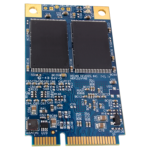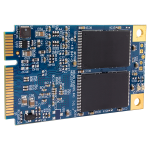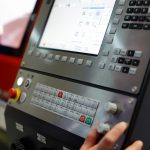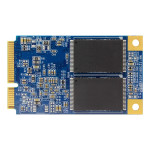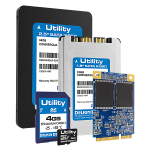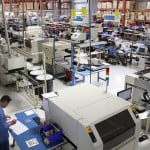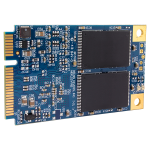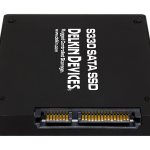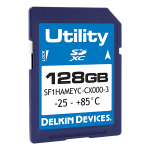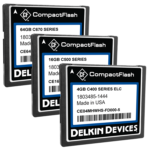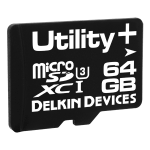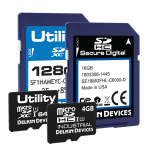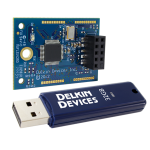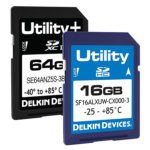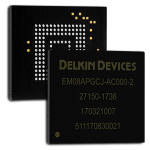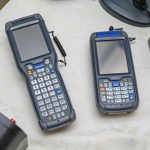Author Archives: Delkin Industrial
Communications Applications Embedded Systems
Within communications applications, flash memory in the form of embedded systems plays many roles. There are enormous demands on industrial flash memory when it comes to communication applications, from the need for high-density, fail-safe systems to wireless applications that are used in environments with high temperatures and high levels of shock and vibration. The key to all of these solutions is embedded memory that can stand up to rugged operating conditions. If you are looking for communications applications embedded...
Read More
Read More
Secure Erase Data Features in Flash Memory
An unavoidable issue that is associated with all electronics is data security. From individual smartphone users to major retailers that store sensitive data, maintaining the security of information stored on electronic devices is of major importance. Unfortunately, if electronic devices are lost or if private information remains on devices after they are discarded, then that sensitive data could easily fall into the hands of the wrong person. That is where Secure Erase data features come into the picture. With...
Read More
Read More
FAQs about Flash Disk SATA
SATA, or Serial ATA, is an interface that is used to create a connection between storage devices and the computer system in which they are used. SATA replaced PATA as the most common interface after its introduction in 2000, thanks to thinner connector cables and faster data transfer capacities. With several redesigns over the years, the SATA interface has kept up with changes in storage devices and computer systems. Flash disk SATA is something that OEMs and designers often...
Read More
Read More
Industrial Flash Storage for Driving Automation
Flash memory may not be the first thing people think about when they consider cars, but as vehicle technology advances, cars are becoming more and more data driven. Fully automated cars rely on an enormous amount of data, but even cars that don’t fall into that category have automated systems that utilize flash memory. Today’s car manufacturers have to be as savvy about choosing flash memory as they are about choosing tires and steering wheels. The role of flash...
Read More
Read More
How Delkin Helped One Customer Overcome SD Card Lifespan Concerns
The evolution of flash technology has been a good thing for developers and end users. However, it has created some complications. It has become more difficult to compare memory devices to determine which one is the best fit for a device and which will have the longest lifespan. Instead of simply choosing between SLC and MLC flash, developers and OEMs now have to consider a variety of options. These often include QLC, and TLC. This makes it more likely...
Read More
Read More
What Are the Benefits of High Endurance Flash Storage?
When choosing flash memory, one of the most important factors to consider is endurance. Though every application’s endurance needs are unique, choosing the appropriate level of endurance will generally prevent problems with device failures and help to reduce costs. For many developers, choosing the highest level of endurance for flash memory is the right choice. There are several advantages to using high endurance flash storage that you should consider when you’re making a decision about memory for your industrial...
Read More
Read More
Flash Disk SATA Drives
Flash disk SATA drives are solid state drives or hard disk drives that use the SATA interface. The SATA interface forms the connection between the data on the drive and the main computer system. SATA replaced PATA—previously known simply as ATA—as an interface, and was favored thanks to its thinner, flexible cables, faster speeds, and higher transfer capacities. Flash disk SATA drives are found in a large number of applications and devices in both the consumer and industrial markets....
Read More
Read More
Flash Storage Encryption
Every file stored on a flash device is important, but some information requires more than a basic level of security. For many military and industrial applications, information is so sensitive that it must be protected from outside intrusion through encryption. With flash storage encryption, any data that falls into the wrong hands will not be readable, providing an additional layer of security for your sensitive data. Encrypting the data on your flash storage device will give you peace of...
Read More
Read More
Understanding Industrial SD for Parking Technologies
Parking technologies have progressed far beyond simply turning a car between two lines. Public parking facilities and parking assistance features inside cars have progressed to include advanced technologies that make parking easier, safer, and more efficient. Industrial Secure Digital( SD), cards are a common choice for these systems, thanks to their broad compatibility and reliable formats. The industrial grade rating means that the cards are able to tolerate the extreme operating conditions that may be encountered in parking situations,...
Read More
Read More
High Temperature Storage Test
For industrial devices, having storage that functions in high temperature environments is crucial. Storage that doesn’t work in extreme temperatures could cause problematic failures in the field for critical devices, including applications in healthcare, travel, and automation. When purchasing industrial grade flash storage, choose a manufacturer who conducts high temperature storage tests on their memory devices. A high temperature storage test is the only way to confirm that a memory device adheres to industrial level extended temperature standards. What do...
Read More
Read More
Taking a Closer Look at Embedded Module Options
An embedded module is a self-contained component that is installed inside of a larger computer system to perform a single, specific task. One of the most crucial types of embedded modules is memory. Embedded storage systems for reading and writing data perform critical functions, often in rugged operating conditions. For this reason, it is important to consider the form and features of any embedded memory module installed in a device, particularly with industrial applications. Here is what you need...
Read More
Read More
Answering Questions about SLC Temperature Ranges
There are many reasons why industrial application designers and engineers opt for SLC flash memory. This industrial grade of flash offers the highest level of data security available, as well as the longest lifespan of any kind of flash memory. The temperature range of SLC is also significant to industrial device designers. SLC flash memory has to operate in rugged conditions in which temperature extremes or wide temperature fluctuations are possible without compromising the integrity of the data or...
Read More
Read More
The Benefits of Low Power SSD Drives
Many industrial device engineers have moved away from hard disk drives, or HDDs, for their storage needs. They instead turn to solid state drives, or SSDs. One of the leading advantages of SSDs is that they have lower power demands than HDDs. This makes them uniquely suited to the ever-growing need for drives that are smaller and more efficient. If you are considering an SSD for your application, read through the following benefits of using low power SSD drives. Low...
Read More
Read More
Understanding Embedded Flash Technology
Flash technology is a popular form of memory for many applications, including small, portable devices used for consumer or industrial purposes. Embedded flash technology refers to embedded memory that is installed in a device and that is designed using flash technology. Some embedded flash memory options are non-removable, while other options may be in the form of removable memory cards. Embedded flash is available in a variety of capacities and specifications. As a result, it can be used in...
Read More
Read More
Answering Questions about mSATA 128GB
For industrial applications in fields such as automation, healthcare, and gaming, the mSATA 128GB capacity drive is a common form of storage. There are several advantages to using mSATA, including the reliable design, which is based on specifications set by the Serial ATA International Organization (SATA-IO). Other benefits include the wide-ranging compatibility thanks to the familiar SATA interface and the high capacity offered in a small form factor. If you are considering using a 128GB mSATA in your device,...
Read More
Read More
Utility Cards
When choosing embedded storage, one of the most important things to consider is the grade of the storage device you select. For industrial users, industrial grade and commercial grade are the two most common forms of storage chosen, depending on the need for speed and security versus capacity. Utility cards are a middle-ground option for many applications. With a utility card, you can typically find extended temperature ranges and other industrial card features paired with MLC flash, which allows...
Read More
Read More
Automation Applications Embedded Systems
Automation applications are changing the way many different industries do business, from manufacturing to the automotive industry. Embedded systems are a big part of that change. Embedded systems are used extensively for automation purposes, as they allow devices to be small, agile, and fast-moving. Though embedded systems can be very complex and involve complicated user interfaces, many are very simple and perform only one task—but the task they perform may be critical to the operation of the system. Here...
Read More
Read More
256GB mSATA
The SATA interface has been enormously popular since its debut in 2003. Since then, it has gone through a series of redesigns to keep up with changing device sizes and structures. The mSATA interface was one of these reiterations of the original SATA design. It debuted in 2009 and has since been used in countless devices. The 256GB mSATA size offers high capacity with the reliable, familiar SATA interface. Despite its large capacity, the 256GB mSATA is available with...
Read More
Read More
Finding an Industrial Storage Supplier
Industrial storage gives engineers and designers of devices that store critical data confidence that their chosen memory system will meet the demands of the operating conditions without compromising any of the stored information. However, the industrial storage supplier you use makes a difference. Choosing the wrong supplier could lead to a range of difficulties, including inconsistencies in supplier quality and design. When you are looking for an industrial storage supplier to assist with your application design, keep these factors...
Read More
Read More
Understanding Secure Erase Features
Data security is a top priority for everyone who uses electronic devices. For industrial customers, this need looms particularly large. Being able to completely wipe drives of data is essential, especially on devices that contain sensitive information, such as those used in military applications. Secure Erase is a feature that was initially designed for HDDs, or hard disk drives. However, it can also be used with solid state drives, or SSDs, which are now more common. Secure Erase completely...
Read More
Read More
Questions to Ask When You Choose Between NAND Memory Manufacturers
NAND memory is a common component of many storage devices, particularly those used in industrial applications. There are many NAND memory manufacturers, but not all NAND memory devices are the same—and not all manufacturers can deliver the right products for your needs. Before you decide which NAND flash memory supplier to go with, it is helpful to ask certain questions. That way, you can get a better understanding of the service they provide and determine whether they’re a good...
Read More
Read More
What Is High Endurance SSD?
When you’re selecting an SSD, or solid state drive, endurance is likely to be one of the parameters with which you are most concerned. The endurance level of an SSD depends on several different factors, including how it is used and the type of flash memory it contains. The good news is that you can easily choose an appropriate high endurance SSD by learning about the differences between drives and picking one that aligns with your needs. Here are...
Read More
Read More
Spotlight on microSD for Navigation/Audio Systems
High-tech navigation systems have long since replaced paper maps in American automobiles and big rigs. These days, they come standard on most late model vehicles. Consumers also expect their in-dashboard audio systems to incorporate the latest cutting-edge technology. The convenience and accessibility of in-vehicle digital files offers clear benefits to transportation manufacturers who need to maintain their competitive edge, yet the trend also places significant demands on data storage. To meet the data storage needs of the modern transportation...
Read More
Read More
Interleaving, Flash Bus Interfaces, and Flash Memory Speed
With industrial grade solid state flash storage, there are several different performance benchmarks that matter including interleaving, interfaces, and speed. OEMs must ensure that data is as secure as possible and that the memory device is not compromised in operating conditions that involve temperature extremes or higher than normal levels of shock and vibration. It is also essential to make sure that the solid state drives (SSDs) used in industrial applications operate as efficient as possible. The combination of...
Read More
Read More
Technical Success Story: Applications and Technology Advancements
For engineers and designers who are building industrial applications, there is a natural inclination to try to design around the most advanced industrial grade storage technology available. The thought process is logical. After all, no one wants a device that relies on outdated memory cards that may not be available in the near future. Choosing the right memory card is an essential part of building a successful device. However, sometimes with the latest technology problems can occur with recently...
Read More
Read More
2D Legacy Flash Storage Moving to 3D Memory
In the world of NAND flash, there is an ever-present motivation to fit more flash memory capacity into a smaller space. Until now, flash memory manufacturers have done this by engineering NAND flash cells to be smaller and smaller and by offering memory options in which multiple bits of data are stored on each cell. However, these solutions were limited by the confines of 2D design. All of the cells were lined up next to each other in a...
Read More
Read More
Delkin’s White Box Storage Products
Are you a company in need of flash memory products that can be branded to carry your name and logo? If so, Delkin has the products you need. We offer a variety of white box storage options to help you deliver the branded products your customers need in a cost-effective and convenient way. By working with one of our dedicated account managers, you can benefit from careful attention to your specific needs, from design to delivery. White Box Packaging Options White...
Read More
Read More
Industrial Grade SD
Secure Digital (SD) cards are a form of flash memory. They are used in devices ranging from digital cameras to in-flight entertainment systems on airplanes. There are multiple grades of SD cards that are designed for use in different kinds of applications. Industrial grade SD is intended for use in industrial applications, such as devices used in transportation, gaming, communications, and automation. Although all SD cards are designed according to the technical specifications set by the Secure Digital Association,...
Read More
Read More
Spotlight on Storage Grades: SSD Utility
Solid state drives, or SSDs, come in various grades in order to meet the functional needs of the devices in which they are used. Industrial SSDs are frequently utilized in industries such as transportation and automation, where they are likely to encounter extreme temperatures, shock, and vibration. Commercial SSDs, on the other hand, are used in some professional devices and in most devices intended for the consumer market. The difference between these grades of SSDs usually lies in the...
Read More
Read More
Specialty Packaging for SD Cards
If you’re an OEM selling flash memory products, you know that branding is everything. Taking a high-quality industrial storage product like an SD card and adding your branding to it increases the visibility of your company and lets your customers know that they are getting a device they can trust. At Delkin, we understand the need for specialty packaging for SD cards. We offer a variety of ways for you to make your memory cards your own. Here is...
Read More
Read More
Industrial Grade CF
Compact Flash, or CF, memory cards offer high-endurance flash storage for a wide range of devices. Industrial grade CF cards are designed to operate in extreme conditions, including environments in which temperatures fluctuate or shock and vibration are higher than normal. For industrial applications, choosing an industrial CF card rather one designed for consumer use is critical. Only with industrial grade memory can you be sure that the storage will work in rugged conditions. Is industrial grade CF flash...
Read More
Read More
Choosing Micro SD Memory Suppliers
When it comes to memory options for small devices, microSD (sometimes called micro SD) is a common solution. This flash memory format is powerful but tiny, providing high-quality memory in devices in which space is at a premium. Different micro SD memory suppliers should all follow the design specs set by the Secure Digital Association. Anyone who makes SD cards is required to follow these guidelines in order to ensure that there is a reliable design and operation standard...
Read More
Read More
Aviation Flash Storage
Flash storage offers a non-volatile form of memory for commercial, consumer, and industrial devices in need of reliable storage that uses minimal power. In aviation, industrial flash memory is a key component of many applications. Because of the demanding operating conditions in which aviation applications are used, aviation flash storage systems have to be able to tolerate temperature extremes, shock, and vibration. SLC, or single-level cell, flash storage is used in aviation applications for this reason. Flash Storage Uses in...
Read More
Read More
SD Card Technology Advantages
CLICK HERE to watch the video presentation on SD Card Technology Advantages SD cards, or Secure Digital cards, are a great choice for flash memory needs. Both SD and microSD cards are used in a variety of retail and industrial applications. However, not all SD cards are created equal. They feature a variety of flash types and capacities, so selecting the right card for your needs is an important part of ensuring that your devices function as reliably and efficiently...
Read More
Read More
FAQs about SATA Thumb Drive Compatibility
Serial ATA, or SATA, is an interface that connects storage to the motherboard in an array of devices. You can find SATA interfaces used with hard disk drives, solid state drives, and optical drives. Even if you aren’t familiar with SATA, you’ve almost certainly used a large number of devices that rely on SATA connectors for data storage and access. Thumb drives, or USB drives, are portable flash storage devices. They can be plugged into most desktop and laptop...
Read More
Read More
Spotlight on JEDEC Flash
For OEMs and designers, being able to rely on the compatibility of device components is critical. As such, many flash products are required to meet standards set by independent organizations. These organizations are comprised of representatives from large numbers of technology companies who work together to determine benchmarks for flash products that maximize reliability and functionality. One such organization is JEDEC, which sets standards for microtechnologies. JEDEC flash has existed since 1958 and has had a tremendous impact on...
Read More
Read More
What Are Industrial SD Cards?
SD cards are memory devices that follow the Secure Digital Association’s parameters and are appropriate for use in a huge array of devices, from cameras to gaming systems. Although SD cards are widely used, they are not all created equal. For industrial applications, using the same SD card that you would find in consumer or commercial grade devices is risky. These kinds of cards are generally not capable of meeting the demands of industrial operating conditions without loss of...
Read More
Read More
Using eMMC for Widgets
Flash memory is a reliable, low-power solution for data storage, but not every device has the need—or space—for an SSD. For these applications, an eMMC could be the solution. This non-volatile form of storage offers the advantages of flash memory in a small format that is appropriate for applications that don’t require the fast speeds of an SSD. Widgets often rely on eMMCs for reliable functionality. What is eMMC? eMMC stands for embedded multimedia card. This type of storage features flash...
Read More
Read More
Industrial Flash Storage for Railroad Applications
Industrial flash storage is used for critical data storage in a number of different transportation applications, including railroad applications. The type of flash storage device chosen for these applications is extremely important, as they require industrial grade memory rather than commercial grade products. Using industrial grade flash storage ensures that the stored data are kept safe, even in the rugged operating environment of railways. Here is a closer look at industrial flash storage for railroad applications. Why opt for industrial...
Read More
Read More
Answering Questions about Industrial Flash Storage Used in Handheld Devices
Flash storage has revolutionized the design and capacity of handheld devices. From smartphones to data scanning tools, flash storage has made handheld devices more rugged and reliable. Although the transition to flash storage in handheld devices did not happen immediately after its development, flash storage is now an essential part of the design of nearly every device available. What exactly is flash storage and how is it being used in handheld devices? Here is what you need to know. What...
Read More
Read More
Characteristics of 128GB mSATA
The 128GB mSATA SSD is a popular storage choice for a variety of applications. From automation to medical systems and transportation, 128GB mSATA SSDs offer the speed, security, and reliability industrial applications require in a small form factor. If you’re considering mSATA for your application, this information about the 128GB mSATA drive will help you make the right choice. mSATA Design Like full-size SATA SSDs, mSATA SSDs conform to the design specifications set by the Serial ATA International Organization, or SATA-IO....
Read More
Read More
Flash Storage Devices
Flash storage is a kind of memory that writes data to a series of chips using electrical charges. There are a number of different formats of flash storage that can be found in applications used in everything from computing to transportation. Flash storage devices have surpassed the popularity of storage using hard disk drives, or HDDs, in industrial, commercial, and consumer applications. There are several benefits to flash storage devices that explain this widespread usage. Flash Storage 101 Flash storage devices...
Read More
Read More
Industrial Flash Storage Devices and Considerations for Custom Features
General This post will describe Industrial Grade Flash Storage Devices and some desirable custom value-added features that extend their effectiveness. Commercial Grade Vs. Industrial Grade Storage Commercial Grade Flash devices are very common and usually inexpensive, and don’t include any custom features. They range from full Disk Drive storage devices used in Laptop personal computers, to very inexpensive USB drives one can buy in any electronics or even supermarkets. USB drives have become commodity items, to the point of very inexpensive ones...
Read More
Read More
Industrial Flash Storage for Oil and Gas Applications
The power and energy sector is a dynamic one that has undergone substantial changes over the years. In modern times, oil and gas companies rely on advanced, cutting-edge technology to collect data from sensors, monitor assets, and plan strategic operations. Oil and gas companies also typically rely on big data analytics to conduct thorough reviews of seismic, drilling, and production data sets. The result of the integration of advanced technology into the power and energy sector is better efficiency...
Read More
Read More
Testing Reliability FAQs
Above all else, industrial flash storage devices must be reliable. After all, they are used to store mission-critical data, often in extremely taxing conditions. One of the best ways to ensure that a storage device will work as expected in operating conditions is to partner with a manufacturer and offer testing reliability services. Delkin is proud to offer a range of reliable testing options for our customers. Continue reading to learn more about the tests we offer to ensure...
Read More
Read More
What Is the Best Industrial SD Card Capable Of?
The Secure Digital (SD) card is a proprietary type of non-volatile flash memory. Originally introduced in 1999, the SD card was intended to replace MultiMediaCards (MMC). Since then, its versatility and portability has made it the flash memory device of choice for use in portable devices, including cameras and smartphones. OEMs who are looking for the best industrial SD card for their particular applications will first want to make sure they are selecting an industrial card, rather than a...
Read More
Read More
Reasons to Use an Encrypted SSD
For years, programmers and OEMs relied on software to provide encryption for their sensitive data. In recent times, however, there has been a shift toward the use of hardware encryption over software encryption. If you are looking for a robust and rugged flash storage solution that already features secure encryption, look no further than Delkin’s industrial single-level cell (SLC) 2.5-inch solid state drive (SSD). This encrypted SSD can withstand extremes in the environment while offering up to 256 GB...
Read More
Read More
Labeling Options for Industrial and Commercial Products
Businesses and OEMs looking to sell branded solid state drives (SSDs), USB drives, and other flash storage products have an easier option than developing their own devices. Instead, they can utilize Delkin’s white label and private label options for industrial and commercial products. Continue reading for a closer look at Delkin’s line of customizable storage devices. Industrial Grade vs. Commercial Grade When considering a storage product, it’s important to know whether it is an industrial grade or commercial grade product, and...
Read More
Read More
Common Questions about Medical Data Storage Solutions
The healthcare field is increasingly becoming a data-driven one. More providers than ever before are switching to electronic health records (EHRs) for managing patient medical histories and care coordination, but EHRs are only one of the factors driving the increase in medical data storage needs. Modern medical equipment also relies on data storage for proper functioning of its components and the preservation of patient information. This means that OEMs who are launching projects in the medical field need to...
Read More
Read More
Partner with Delkin for Widget Flash Storage
Programming professionals rely on widget toolkits to construct the graphical user interface (GUI) of various programs across different operating systems. Ideally, widgets should be seamlessly integrated into the operating system so that the end user can easily and intuitively manipulate the application. If you are a project engineer or OEM who is working with a widget toolkit or GUI framework, you will likely need a solution for storing your widgets. The Customer Applications team at Delkin can help you...
Read More
Read More
 Login
Login Register
Register




